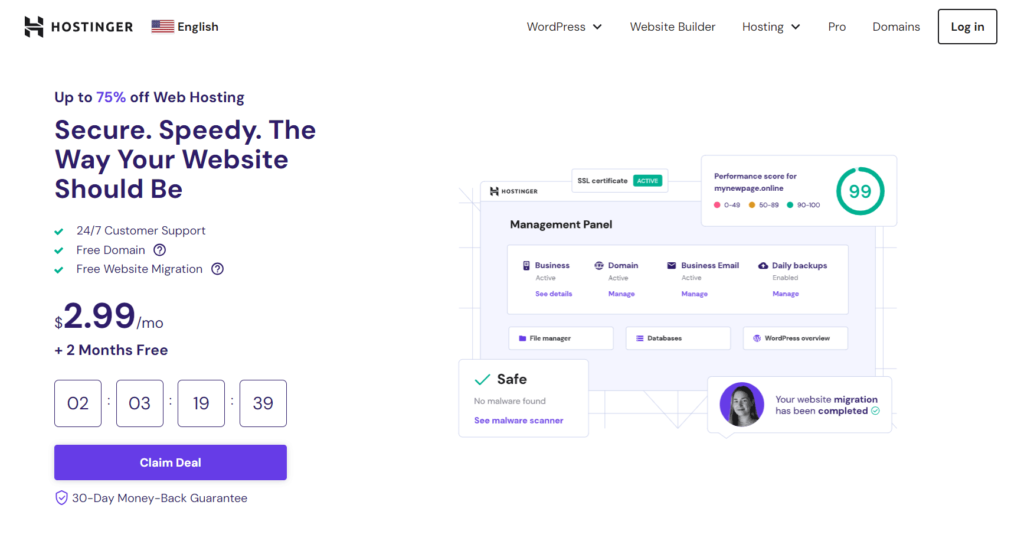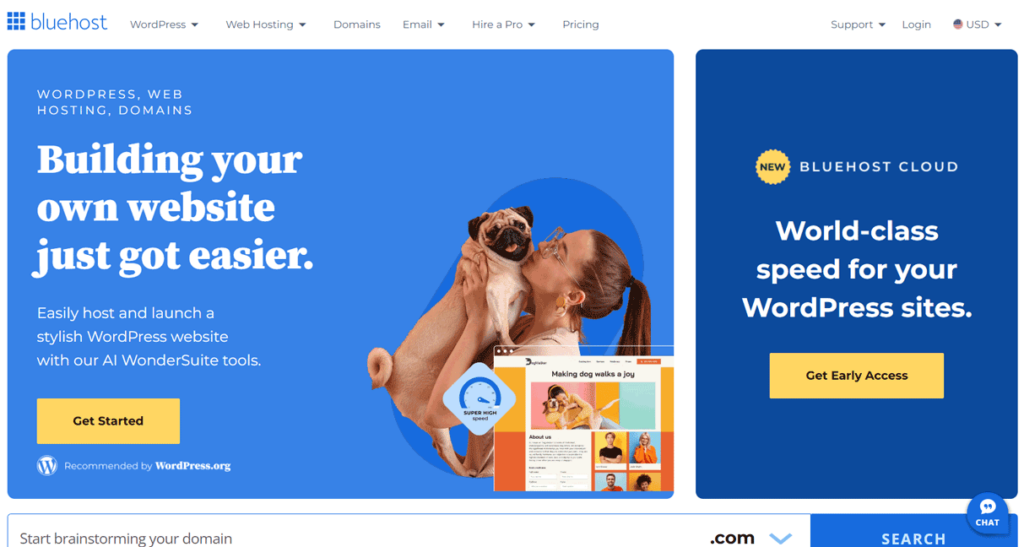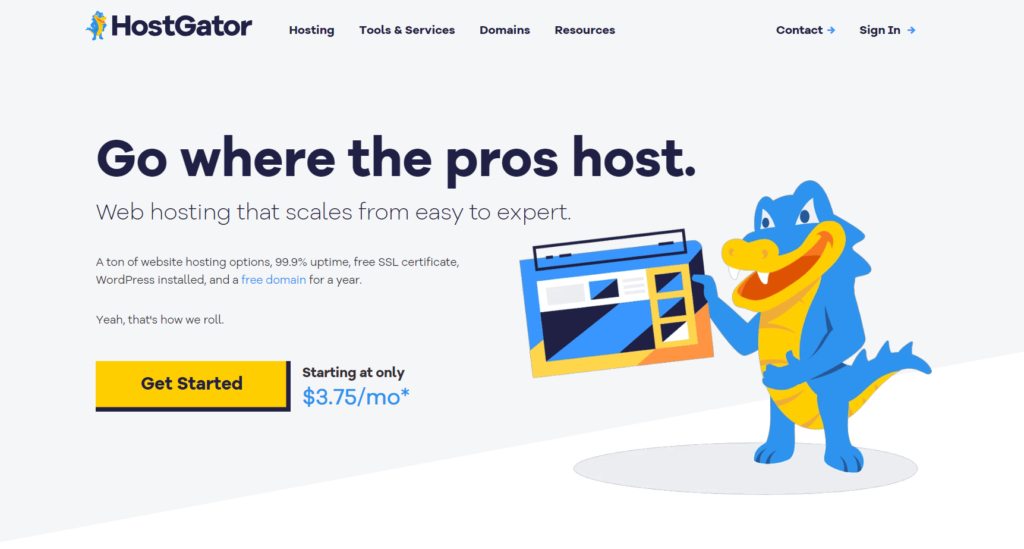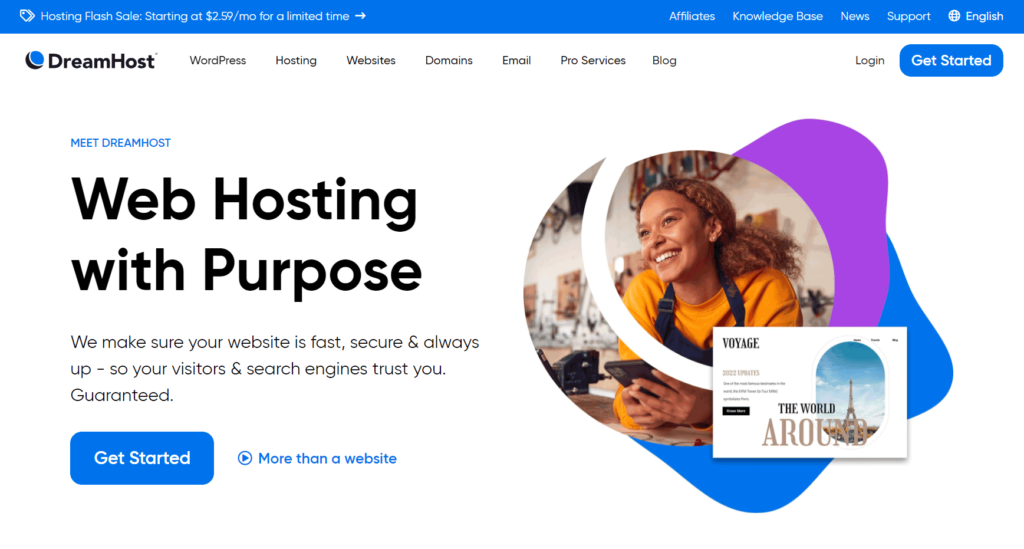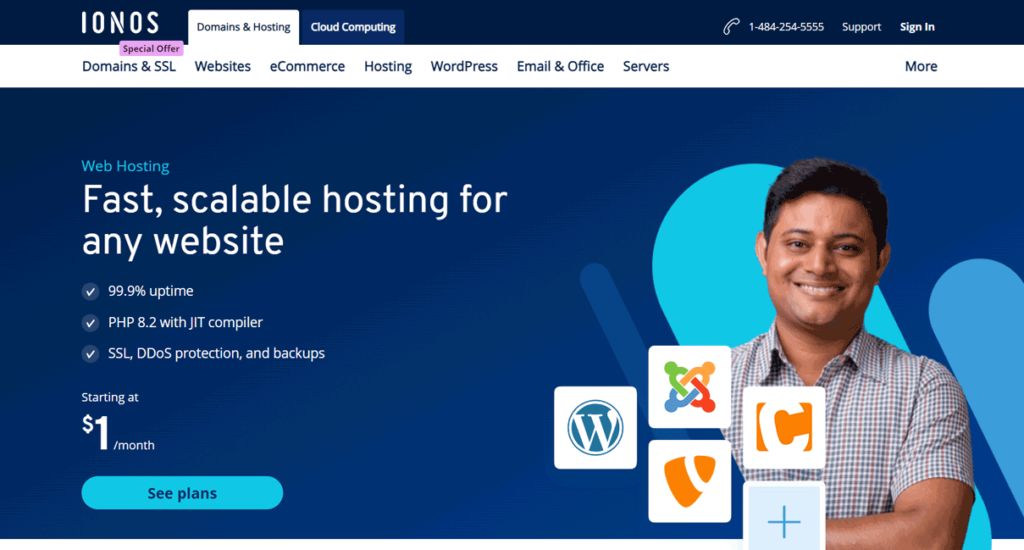Table of Contents
The surge in demand for eCommerce websites reflects businesses’ drive to establish a compelling online presence and effectively promote their products and services. Alongside this escalating need is the growing accessibility and simplicity of hosting eCommerce sites. The current market boasts numerous website hosting providers, each striving to claim the title of the best in the business.
However, it’s important to remain discerning, as not all hosting providers offer eCommerce plans or possess sufficient resources to support e-shops with the specific features required for business websites. An ideal eCommerce hosting provider should offer robust performance, business email services, content management tools, and other eCommerce-specific features to cater to the evolving needs of online businesses.
After rigorously testing numerous hosting providers, this article narrows down the list to the best hosting services for eCommerce, guiding you through essential features and demonstrating how these eCommerce web hosts excel in those areas.
1. Hostinger
2. Bluehost
3. HostGator
4. DreamHost
5. SiteGround
6. IONOS
7. GoDaddy
Overview of the Best Web Hosting for E-commerce
How to Choose from the Best Web Hosting for E-commerce
Pros and Cons of the Best Web Hosting for E-commerce
What to Watch Out For
Pro Tips
Recap
1. Hostinger
Hostinger offers a variety of hosting plans tailored for eCommerce websites, providing features like Cloudflare protected nameservers, automatic backups, 99.9% uptime, and resources including custom domains, email accounts, and free SSL certificates, making it ideal for hosting up to 100 websites and selling products or services online with ease and security.
- • Provides strong security features to protect your store and customers.
• Automates setup for WordPress sites, SSL, and domains.
• Offers the cheapest prices for the value and quality provided.
• Focuses on speed to enhance platform performance.
• Operates servers in 8 locations worldwide to ensure broad coverage.
- • The simplicity of the platform might limit advanced users looking for more customizable options.
• Weekly backups might not be frequent enough for stores with high transaction volumes.
• Dependency on external apps for some eCommerce functionalities not natively supported.
- • Provides a drag-and-drop builder for easy website creation.
• Includes free email services with hosting plans.
• Ensures website security with a free SSL certificate.
• Supports customers with 24/7 customer service.
• Offers competitive pricing starting from $9.99/month.
MORE >>> GoDaddy Web Hosting Review
2. Bluehost
Bluehost optimizes your ecommerce capabilities, offering features like YITH for easy booking and appointment scheduling, website analytics, 100GB of SSD storage, free domain and SSL, and SEO enhancements with Yoast, along with daily backups, secure payments, and unlimited product listings.
- • Integrates seamlessly with WordPress, enhancing functionality.
• Provides staging to test changes before going live.
• Includes free domain, SSL, and email for the first year.
• Ensures site security with automatic backups and DDoS protection.
• Maintains 99.99% uptime, ensuring reliable site availability.
- • Prioritizes user experience over speed, which may impact fast loading times.
• Operates servers only in the US, potentially limiting global reach.
• Pricing starts higher compared to some competitors, affecting budget-conscious users.
- • Offers a range of hosting plans suitable for all sizes of ecommerce businesses.
• Features unlimited SSD storage and unmetered bandwidth in mid-tier plans.
• Supports easy WooCommerce integration with a one-click setup for WordPress sites.
• Includes essential ecommerce features like automatic data backups and a free CDN.
• Starts with a competitive pricing model from $9.95/month.
3. HostGator
HostGator offers a wide range of service levels for e-commerce store owners, including Shared Web Hosting, Website Builder, and various specialized hosting plans to suit both new and established businesses, with extensive options up to Enterprise-level at competitive prices.
- • Provides free email services, allowing business owners to establish professional communication channels without additional costs.
• Provides a 30-day money-back guarantee
• Ensures unmetered bandwidth and disk space
• Guarantees 99% uptime, ensuring minimal disruption to online operations and customer access.
• Grants access to cPanel, a popular and user-friendly control panel for managing website hosting and settings.
• Provides SEO tools, empowering businesses to optimize their online presence and visibility.
- • Increases prices after first year
• Presents a complex choice
• Has a clunky user interface
- • Guarantees 99.9% uptime, ensuring consistent availability of your ecommerce site.
• Provides dedicated IP addresses, enhancing security and boosting SEO potential.
• Conducts weekly off-site automatic backups, safeguarding your site data reliably.
• Offers unlimited email accounts, facilitating comprehensive communications capabilities.
• Delivers round-the-clock support, ensuring help is available at any time.
• Starts pricing at $19.95/month for private VPS plans, making it a competitive option for ecommerce hosting.
4. DreamHost
DreamHost offers three e-commerce hosting plans—DreamPress, DreamPress Plus, and DreamPress Pro—featuring a 100% uptime guarantee, unlimited email, at least 30GB of SSD storage, unmetered bandwidth, one-click staging, free automated WordPress migrations, and 24/7 expert WordPress support, all at a price that saves up to 17% annually.
- • Pre-install WooCommerce on all WordPress plans for easy setup.
• Offers unlimited bandwidth for handling high traffic volumes.
• Provides affordable and flexible pricing structures to accommodate different business sizes.
• Ensures high privacy and security with free SSLs and automatic backups.
• Delivers reliable and speedy performance, with server optimizations for US-based audiences.
- • Limits server locations to the US only, which may affect international loading times.
• Offers limited customer support hours for live chat, restricting immediate help to certain times.
- • Offer a 100% uptime guarantee for all hosting plans.
• Provide access to WooCommerce plugin for ecommerce enhancements.
• Include one-click staging and at least 30 GB of SSD storage.
• Facilitate free WordPress migrations and unlimited email.
• Implement strong security measures to protect ecommerce transactions.
• Deliver 24/7 expert support to resolve issues and guide users.
• Start pricing at $2.59/month for the shared starter plan.
5. SiteGround
SiteGround offers WooCommerce-powered e-commerce hosting plans featuring a single website hosting, 10GB web space, capacity for 10,000 monthly visits, unmetered traffic, and various WordPress tools, with initial discounts reducing the first year’s monthly fee to $2.99 before it renews at $17.99..
- • Achieve very fast site loading speeds.
• Provide a staging environment for WordPress.
• Operate servers in 8 countries worldwide.
• Ensure strong security features.
- • Charges rates on the higher end.
• Excludes domain inclusion in the plans.
- • Supports over 2.8 million domains globally.
• Achieves a 98% customer satisfaction rate.
• Recommends by WordPress for robust hosting features.
• Provides Cloudflare protection for enhanced security.
• Integrates WooCommerce hosting for e-commerce flexibility.
• Monitors security constantly to safeguard your data.
• Offers free daily backups to prevent data loss.
• Ensures 24/7 customer support for uninterrupted assistance.
• Starts pricing at $4.99 per month for basic hosting services.
• Requires integrating an external, compliant platform for PCI compliance, potentially increasing costs.
PRO TIPS >>> How To Do Web Hosting for Free
6. IONOS
IONOS enhances e-commerce web hosting with dual-platform technology for speed, HTTP/2 for fast load times, scalable performance, and robust security features including DDoS protection, automatic backups, and a Wildcard SSL certificate.
- • Enhances fast performance with dual-platform technology and HTTP/2 protocol.
• Protects against DDoS attacks for enhanced security.
• Provides automatic backups of up to six days of data.
• Includes a content delivery network (CDN) for faster content delivery.
• Supports social selling features for integrated marketing.
- • Lacks a free trial to test services before commitment.
• Does not offer a free plan, which might deter some potential users.
- • Ensures 99% uptime with support from two data centers.
• Allocates 500 GB of storage for extensive data needs.
• Includes website analytics for monitoring visitor data and insights.
• Boosts performance with enhanced CPU resources.
• Facilitates easy setup with a one-click install function for e-commerce platforms like Shopify.
• Achieves faster loading times than many competitors, including GoDaddy, HostGator, and Bluehost.
• Challenges new users with a control panel that requires a learning curve.
• Sets pricing at $8/month for the first 12 months for the Web Hosting Expert package.
7. GoDaddy
GoDaddy offers four scalable hosting packages with features like access to 150 free apps, one-click WordPress installation, global data centers, and 24/7 security, starting at $9.99/month for the economy plan, with upgrades available for increased processing power, speed, and security.
- • Provides access to 150 free apps for enhanced functionality.
• Enables one-click WordPress installation for ease of use.
• Utilizes global data centers to ensure fast site loading.
• Maintains 24/7 security monitoring for customer protection.
- • Requires plan upgrades for better processing power and speed as your business grows.
• Charges from $9.99/month for the basic economy plan, which may escalate with higher-tier plans needed for additional features like more storage and free SSL certificates.
- • Holds a significant 10.4% market share in web hosting, indicating widespread use and trust.
• Offers four diverse hosting packages tailored to varying needs of storage, bandwidth, and processing power.
• Provides access to 150 free apps to enhance website functionality and user experience.
• Utilizes global data centers to deliver fast site loading times across different geographical locations.
• Maintains stringent 24/7 security measures to protect online stores.
• Requires upgrades to higher-tier plans, such as the Ultimate or Maximum, for enhanced processing power, speed, and additional features like 100 GB of storage and free SSL certificates as businesses grow.
• Sets starting price at $9.99/month for the basic economy plan, catering to budget-conscious businesses while offering scalability.
Overview of the Best Web Hosting for E-commerce

When selecting the best web hosting for your eCommerce business, consider a provider that offers scalable performance, robust security features, and reliable customer support. Look for hosts that provide one-click installations for popular eCommerce platforms, as well as SSL certificates to ensure secure transactions.
Global data centers can significantly improve your site’s loading times, enhancing customer experience. Pricing varies, so starting with a budget-friendly option that allows for upgrades as your business grows is wise. Ultimately, a web host that combines speed, security, and scalability will set the foundation for your online store’s success.
How to Choose from the Best Web Hosting for E-commerce
- Assess your specific needs including storage, bandwidth, and processing power, tailoring your choice to the size and scale of your eCommerce business.
- Compare hosting packages across different providers to find those that offer scalability and can accommodate growth without requiring frequent, costly upgrades.
- Investigate the security measures provided by each host, such as SSL certificates, DDoS protection, and automatic backups, to ensure your site and customer data remain secure.
- Evaluate the performance metrics of potential hosts, particularly their site loading times and uptime guarantees, as these affect customer satisfaction and sales.
- Check for additional features beneficial for eCommerce, like one-click installations for platforms like WooCommerce or Shopify, and support for handling high traffic volumes.
- Review pricing structures, not just for initial costs but also for renewal rates and any hidden fees associated with the hosting plans.
GET SMARTER >>> Ionos Web Hosting Review
Pros and Cons of the Best Web Hosting for E-commerce
Pros
- Deliver robust uptime guarantees to ensure your eCommerce site is always accessible to customers.
- Provide high-speed server performance which can boost site speed and improve user experience.
- Offer strong security measures, including SSL certificates, DDoS protection, and regular backups to safeguard your data.
- Include scalability options to accommodate your business growth without the need for a provider switch.
- Support a variety of eCommerce platforms with easy installation processes, streamlining site setup and management.
Cons
- Charge higher fees for premium features and greater bandwidth or storage, impacting your budget.
- Limit customization options in lower-tier plans, potentially restricting your site’s functionality.
- Require technical knowledge for managing more complex hosting environments, which might necessitate additional staff training or hiring specialists.
- Vary in the quality of customer support, with some providers offering slower response times or less helpful service.
- Enforce long-term contracts with steep cancellation fees, reducing flexibility to change providers if dissatisfied.
What To Watch Out For
- Monitor performance metrics closely, including uptime and load speed, to ensure they meet the needs of a high-traffic eCommerce site.
- Beware of long-term contracts that may lock you into a service that doesn’t evolve with your business needs or market technology changes.
- Verify the level and responsiveness of customer support, as effective and timely assistance is crucial for resolving any issues swiftly.
- Examine the security features thoroughly to ensure they include up-to-date protection measures like SSL certificates, DDoS protection, and regular malware scans.
- Review the scalability options to confirm that the hosting can handle increased traffic and storage needs as your business grows.
- Check for hidden fees or clauses in the service agreement that could lead to unexpected costs or constraints on your business operations.
Pro Tips

- Opt for a host with SSD storage for faster data access and improved performance.
- Select a provider that allows easy resource scaling to match your traffic and sales needs.
- Look for hosting services with built-in caching like Varnish or Redis to speed up page loads.
- Choose a host offering comprehensive security features like automatic updates and malware scanning.
Recap
When choosing the best web hosting for your eCommerce site, prioritize providers that offer SSD storage for faster performance and advanced caching mechanisms to speed up page load times. Ensure the host allows for easy scalability so you can adjust resources as your traffic and sales grow.
Security is paramount, so select a service that includes robust protections like automatic updates, malware scanning, and proactive threat detection. Lastly, consider customer support availability and the overall cost, including any potential hidden fees, to ensure the hosting service aligns with your business needs and budget.



